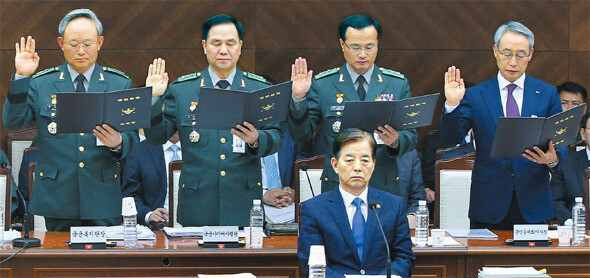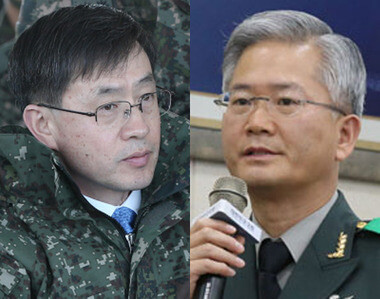hankyoreh
Links to other country sites 다른 나라 사이트 링크
Cyber Command repeatedly interfered on behalf of ruling party

At every major election - the by-election on Oct. 26, 2011, the general election on Apr. 11, 2012, and the presidential election on Dec. 19, 2012 - the South Korean military’s Cyber Warfare Command has actively sided with the Saenuri Party (NFP), a document shows.
This is the first time that reports have confirmed the specific ways in which cyber command agents were interfering in politics, which included posting and sharing messages on Twitter and other social media.
According to the list of charges against Ok Do-kyung and Yeon Je-wook, former directors of the cyber command, that the Hankyoreh received from the office of Saenuri Party (NFP) lawmaker Jeon Hae-cheol on Nov. 19, the Cyber Command made a concerted effort during every major election.
From Nov. 2012 until Dec. 19 of that year, when votes were cast in the presidential election, agents with the cyber command wrote and shared hundreds of posts related to the election. The majority of these posts were aimed at supporting or opposing particular candidates.
“Park Geun-hye is the top choice for president of South Korea. She’s definitely prepared for the job,” one comment read.
“If you let Moon Jae-in fool you, the floodgates will open to the North,” another said. Moon, the liberal opposition party‘s candidate for president, went on to lose to Park Geun-hye in the 2012 election.
The intensity of the Cyber Command’s activity varied with the political schedule. Starting one month before the election in Nov. 2012, agents with the command wrote an average of twenty posts per day.

But after the election, this activity slowed considerably. On Dec. 20, 2012, there was one post; on Dec. 21, none, and on Dec. 22, two. This demonstrates that the primary objective of this activity was to influence the election.
In addition, the attacks made on the opposition politicians were closely connected to their status in the election. In early 2012, when Ahn Cheol-soo, then a promising opposition candidate and currently a lawmaker with the opposition New Politics Alliance for Democracy, had yet to make clear his intention to run for president, the posts made by the Cyber Command were generally warning shots. “Cheol-soo’s not suited for politics,” one comment read.
But the cyber command aimed to kill after Ahn became a leading contender in the presidential campaign. Agents used the insulting nickname “Gan Cheol-soo,” (sounds like “wicked spy” in Korean) which punned on a Korean word for tasting food to suggest that Ahn has trouble committing himself to anything. “Silly, irresponsible Ahn Cheol-soo is talking about apologizing for the naval base on Jeju Island. We can’t entrust the country to people who will do anything to get what they want,” a comment read on Nov. 2.
When a proposal to extend the time for voting become controversial, cyber command agents shared a document called “Fears and Misunderstandings about Extending the Voting Time” 150 times between Nov. 6 and Nov. 14.
Immediately after the first televised debate - during which Unified Progressive Party candidate Lee Jung-hee said she had joined the debate to keep Park Geun-hye from being elected - agents posted around 90 comments that criticized Lee and argued that “the mafia should be kicked out of politics.”
The cyber command was also actively involved in the general election on Apr. 11, 2012. The main subject of their posts were criticism of Han Myeong-sook, then head of the opposition United Democratic Party, and debate about rash comments made by Kim Yong-min, who was a candidate for the National Assembly. After the election ended with a victory for the Saenuri Party, the Cyber Command basically stopped posting comments attacking the two figures.
When the Cyber Command initiated its comment campaign at the end of 2011, the target of the “bashing operation” was Park Won-soon, who was elected mayor of Seoul in the by-election on Oct. 26.
A total of 122 agents were involved in writing political comments, the document shows. This is more than half of the approximately 200 agents in the cyber command’s psychological warfare division. It is this point that has given rise to suspicions that the cyber command was in fact created to interfere with politics.
Another issue is that Yeon Je-wook and Ok Do-kyung, former directors of the Cyber Command, were briefed and gave orders on this activity on a daily basis. Despite this, the prosecutors in the Ministry of National Defense wrapped up their investigation by indicting the two former directors of the cyber command on charges of political interference under the Military Criminal Act without even questioning Kim Kwan-jin, Minister of National Defense at the time. Kim is currently the Blue House National Security Chief.
“It’s mind-boggling that the prosecutors found that Kim Kwan-jin, who was Defense Minister when all this was going down, had nothing to do with this even after it came out that the two heads of the Cyber Command were being briefed every day on the political interference that the organization was carrying out,” said Jeon Hae-cheol, the Saenuri Party lawmaker.
By Noh Hyun-woong and Jung Hwan-bong, staff reporters
Please direct questions or comments to [english@hani.co.kr]

Editorial・opinion
![[Column] Has Korea, too, crossed the Rubicon on China? [Column] Has Korea, too, crossed the Rubicon on China?](https://flexible.img.hani.co.kr/flexible/normal/500/300/imgdb/original/2024/0419/9317135153409185.jpg) [Column] Has Korea, too, crossed the Rubicon on China?
[Column] Has Korea, too, crossed the Rubicon on China?![[Correspondent’s column] In Japan’s alliance with US, echoes of its past alliances with UK [Correspondent’s column] In Japan’s alliance with US, echoes of its past alliances with UK](https://flexible.img.hani.co.kr/flexible/normal/500/300/imgdb/original/2024/0419/2317135166563519.jpg) [Correspondent’s column] In Japan’s alliance with US, echoes of its past alliances with UK
[Correspondent’s column] In Japan’s alliance with US, echoes of its past alliances with UK- [Editorial] Does Yoon think the Korean public is wrong?
- [Editorial] As it bolsters its alliance with US, Japan must be accountable for past
- [Guest essay] Amending the Constitution is Yoon’s key to leaving office in public’s good graces
- [Editorial] 10 years on, lessons of Sewol tragedy must never be forgotten
- [Column] A death blow to Korea’s prosecutor politics
- [Correspondent’s column] The US and the end of Japanese pacifism
- [Guest essay] How Korea turned its trainee doctors into monsters
- [Guest essay] As someone who helped forge Seoul-Moscow ties, their status today troubles me
Most viewed articles
- 1[Column] The clock is ticking for Korea’s first lady
- 2Samsung barricades office as unionized workers strike for better conditions
- 3[Editorial] When the choice is kids or career, Korea will never overcome birth rate woes
- 4[News analysis] After elections, prosecutorial reform will likely make legislative agenda
- 5S. Korea, Japan reaffirm commitment to strengthening trilateral ties with US
- 6All eyes on Xiaomi after it pulls off EV that Apple couldn’t
- 7After 2 months of delayed, denied medical care, Koreans worry worst may be yet to come
- 8US overtakes China as Korea’s top export market, prompting trade sanction jitters
- 9[Column] Has Korea, too, crossed the Rubicon on China?
- 10Hong Se-hwa, voice for tolerance whose memoir of exile touched a chord, dies at 76